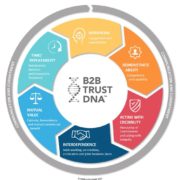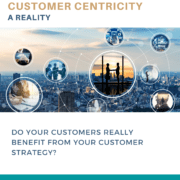Define Trust – What’s in a name?
Mark Hollyoake shares insights from his doctorate on trust within B2B
When I began my DBA, the first academic task was to define what trust meant in the context of B2B. There are many different definitions out there, some similar, others poles apart. Analysing them enabled me to identify common patterns and potential gaps, which in turn deepened my understanding of the problems organisations face. Here’s why:
Reliability and credibility, underpinned by belief, confidence and benevolence, are common to B2B trust definitions. Action and exchange surface as the link between the relationship and the outcomes from that relationship. However, these don’t explicitly take into account aspects we know to be part and parcel of B2B, namely: risk, vulnerability, and relationships serviced over time.
Few existing definitions embrace the importance of time – trust emerges through transactions over time. Yet, without a customer dynamic which allows for repeated interactions, the reliability and credibility (above) can easily be undermined by opportunistic behaviours (e.g. Deducting extra margin from the invoice, taking longer to pay, not paying, etc ). Working with customers over time builds trust through resource expertise, importance, processes, procedures, joint actions, mutual investments.
Some definitions claim positive outcomes from trust in reducing costs and improving performance, but these claims are really outcomes of a high trust relationship, rather than a component of it. The mutual value exchange developed in high trust relationships is absent from most definitions which is essential in B2B where relationships tend to be more complex. A working definition must encompass B2B’s key elements: vulnerability, credibility, longevity, interdependence, reciprocity and mutual value.
Working with an accurate and clear definition determines not only how trust in B2B is studied, but leads to the creation of knowledge which can help or hinder our world. Perhaps it’s no co-incidence, that hazy definitions have been the reason that trust research has been misapplied to B2B, or applied with indifferent results to date.
This is the definition I am working with:
‘The willingness to be vulnerable to another party and the decision to engage in actions based upon an understanding of their ability, credibility and the expectations of mutual value exchange over time.’
If You Only Do One Thing…make sure the insight you develop within the relationship offers strategic value add.
Have a view on this? Tweet to @customerattune or Tweet to @MarkHollyoake
Contact us at hello@customerattuned.com
To download The Trust Ladder e-book fill out this form and we will e-mail you a copy
PLEASE CHECK YOUR SPAM FOLDER [Form id=”16″]
- Stop hiding behind your computer and get out to see your customers! - March 6, 2024
- B2B Trust Research: What are Boundary Spanners? - January 31, 2024
- A Business to Business Model of Trust - June 27, 2023


